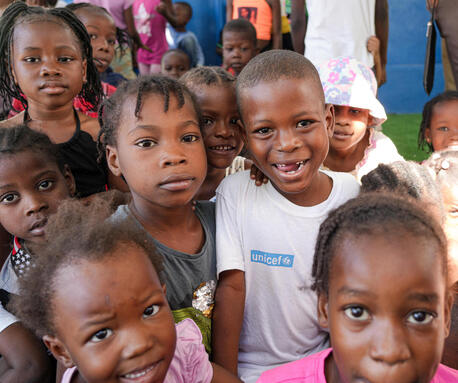
UNICEF in Haiti
UNICEF is on the ground in Haiti reaching vulnerable children and families with essential services and support amid multiple humanitarian crises in the country. The needs have never been greater.
Crisis in Haiti leaves 2 in 3 children in need of humanitarian aid
Surging violence between armed groups, public health emergencies and a deepening economic crisis are threatening the lives and futures of more and more children in Haiti.
“Hundreds of thousands of children and their families live in some of the most dangerous and besieged communes," Executive Director Catherine Russell said in a March 6, 2024 statement. "Spaces for children have been transformed into battlegrounds; critical social services are on the brink of collapse; the country’s ports and airport are compromised; and the humanitarian response that millions of children and civilians rely on as a lifeline of last resort has been crippled...
"But it doesn't have to be this way. Despite all the obstacles, the humanitarian system is still delivering lifesaving support, and the people of Haiti – teachers, medics, mothers and fathers – continue to brave the dangers to show up for work and care for the country’s women and children.
“The international community needs to work with the Haitian people and seize this moment to stop Haiti from spiraling further out of control. Now is the time to act with urgency and together with the Haitian people."
Multiple threats to children's health, safety and well-being
By March 2024, over 362,000 desperate people were internally displaced, and hunger and life-threatening malnutrition were at a record high across the country.
Poverty has long been widespread, with nearly two-thirds of the population living on less than $2 a day.
Cholera is once again a major threat. Providing the necessary services and support to those in need is complicated by fuel shortages and rising insecurity in the greater Port-au-Prince area.
Malnutrition in children makes them more susceptible to disease and less likely to recover from a treatable illness. “When you are unable to get safe drinking water by tap in your own home, when you don’t have soap or water purifying tablets and you have no access to health services, you may not survive cholera or other waterborne diseases,” UNICEF Haiti Representative Bruno Maes says.
Decades of suffering in Haiti
Haiti has long dealt with multiple social, political and economic crises. The country lost many of its skilled professionals as teachers, health and social workers fled the country. Health care, including routine immunizations and primary health care services for pregnant women and children, have become increasingly difficult to access amid system collapse.
Hurricanes and floods are constant reminders of the country's vulnerability to climate change. Earthquakes are also a constant threat.
An increasing number of families try to migrate from Haiti, putting more and more children at risk of becoming separated from their parents and missing out on health care and education.
How UNICEF helps children in Haiti
Despite security and logistical challenges, UNICEF teams remain on the ground in Haiti working to help keep children safe from violence and to deliver the nutrition support, health care, education and protection they need to survive and thrive.
Ongoing programs and interventions include:
- screening and treating malnourished children for severe acute malnutrition (SAM)
- immunizing children to protect them from vaccine-preventable diseases
- increasing access to safe water, strengthening sanitation and hygiene systems and services to boost disease prevention
- supporting the reunification of families and arranging for care for children living without caregivers
- providing counseling and emotional support to children exposed to violence and those involved in child labor or other forms of exploitation
- strengthening protections for children at heightened risk of gender-based violence
- creating safe spaces for children to learn and play and to receive mental health and psychosocial support among other services
- getting out-of-school children back to learning and distributing learning materials
- providing cash transfers to impoverished families
Amid surging violence, UNICEF has urged the international community to work with the Haitian people and help provide a response that can better restore trust, hope and respect for international human rights law.
“By doing so, the international community will send a powerful message of unity and hope, not only to the people of Haiti but also to civilians across the world who are suffering violence, deprivation, and human rights abuses and violations," Russell said.
As part of this call to action, UNICEF is advocating for:
- accelerating efforts from the international community, with and for the Haitian people, to protect civilians, restore law and order in the streets, and strengthen key institutions, the Haitian National police, and the justice system
- full funding of the current humanitarian action plan to meet the needs of the most vulnerable children and families
- protecting schools, hospitals and humanitarian access, and safeguarding humanitarian spaces
- ensuring humanitarian efforts are coupled with longer term solutions to ensure access to basic services
- strengthening preparation and response to natural disasters, public health emergencies and epidemics
- encouraging and supporting national institutions to effectively engage with impacted communities as well as those who have influence to stop the violence
UNICEF works in over 190 countries and territories to assist children in need. Your support can make a difference.